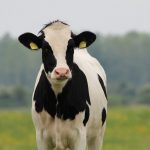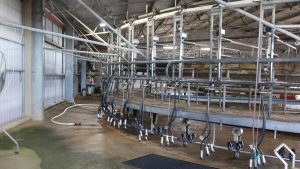
Victoria’s two biggest milk processors may have offered farmers a step up as a way of ensuring future loyalty.
Saputo Dairy Australia has announced a 10 cents a kilogram Milk Solids step up, retrospective to July 1, while Fonterra Australia quickly followed suit, increasing its average farmgate milk price to $7.10/kg MS.
“This increases our weighted average farmgate milk price in the 2021-22 season in the Southern Milk Region to $7.05/kg MS (up from $6.95/kg MS),” SDA supplier relations director Anthony Cook told producers.
“Our domestic retail business continues to perform well and we hope to see improvements in the food service sector moving forward, which has been impacted by ongoing lockdowns.”
Fonterra Australia managing director Rene Dedoncker said since the last price review in August, market conditions globally had remained positive.
“We’ve continued to see strong domestic demand, particularly for our consumer brands, and we expect to see the foodservice sector rebound as restrictions ease across Victoria and NSW,” Mr Dedoncker said.
“This gives us confidence in the fundamentals of our business and that we can continue to earn and pay a competitive milk price.”
It follows warnings from the Australian Dairy Products Federation in the remaining quarter of 2021 that processors faced input pressures amidst tightening margins and milk supply.
United Dairyfarmers of Victoria president Paul Mumford said he believed processors were looking to shore up milk supply for future seasons.
“We have to understand we operate with a Dairy Code of Conduct and that somewhat locks the farmers to the processors for the 12 months,” Mr Mumford said.
“What is transpiring is the sheer competition for milk and the need to build those relationships with farmers for the future.”
He said farmers were still leaving the industry, due to the high cost of production, including fertiliser and energy, and labour shortages.
“They are tired and there is opportunity knocking at their door, to capitalise on extraordinary land prices – they are questioning why they are here,” he said.
On the positive side, he said processors where paying good prices for milk.
“If farmers are in a profitable position for some years that will give them confidence to make decisions, whether that’s to grow their business or diversify,” he said.
“Money in the bank gives farmers the confidence to expand.”
Bruce Glasgow, Derryvale Dairy, Bena, said SDA and Fonterra’s decisions to step up didn’t seem to make sense, as farmers were locked into contracts.
“They are dangling a carrot in front of us, I suppose,” Mr Glasgow said.
“I am with Bega as it suits my calving pattern.
“I would have to run the figures but I think it would take a bit of beating with the nine and three that Bega run.”
He said changing processors was not a simple matter.
“We are well and truly into spring, so peak production is nearly over for us,” he said.
Market analyst FreshAgenda director Steve Spencer described the step ups as courageous.
“Processors can certainly see a lift in commodity values, as the market has taken off, but their operating costs are also rising and COVID-19 is hard to manage in their plants,” Mr Spencer said.
The increase in milk price came as processors were struggling to maintain milk supply, with Victorian production continuing to fall.
The latest Dairy Australia figures show production in Gippsland is down by 4.1 per cent so far this year, while the northern region has dropped by 2.3pc and there’s been a reduction in the west of 5.4pc.
Victoria was down 3.7pc, or 21.16 million litres, from August to September.
Dairy Australia industry insights and analysis manager John Droppert said wet weather was having a big impact on production volumes.
“It’s too wet to get onto paddocks, silage is delayed and cold weather is impacting milk yields,” Mr Droppert said.
He said there were also ongoing farm exits and retirements, with many farms being sold to beef producers.
“High beef prices are encouraging rearing of beef calves on dairy farms,” he said.
He said ongoing labour challenges were also an issue.
“There are good margins but a late season, not enough labour and plenty of temptation coming from elsewhere [are reducing herd numbers],” he said.

























